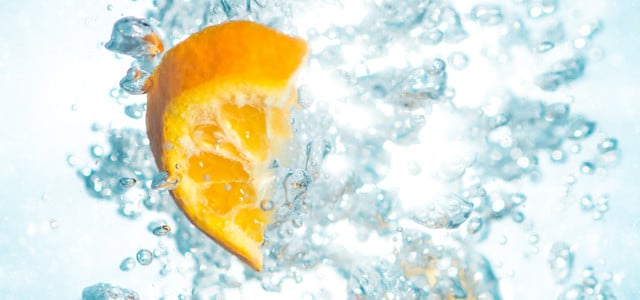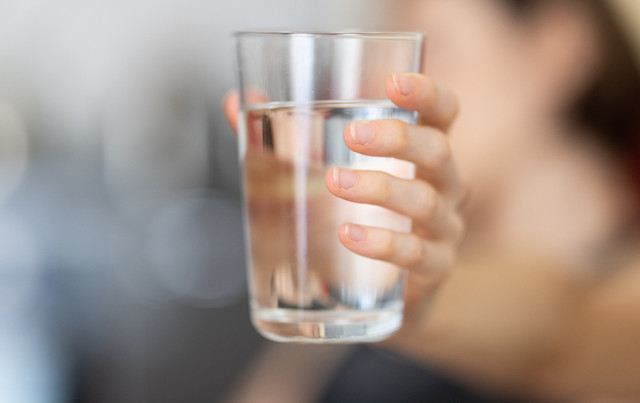
The high summer temperatures are currently affecting many people. It is important that you drink enough. But how much water should you drink per day? And what are the best thirst quenchers in extreme heat?
Every child knows that drinking a lot is important. We need water to keep our metabolism running and our body healthy. Water transports dissolved nutrients to the cells, our kidneys need water to flush waste products out of the body and water helps regulate body temperature: our body produces sweat to cool the skin so that the body temperature does not rise too much.
What happens if we don’t drink enough?
Even a small loss of fluids makes us less productive. We react with headaches, become tired and are no longer able to concentrate. If the deficiency is greater, we experience circulatory problems, heart palpitations and dizziness.
Anyone who drinks too little and becomes dehydrated for a long period of time can expect serious health problems, explains Professor Dr. Jan C. Galle, press spokesman for the German Society for Nephrology (DGfN). The blood thickens, and this can lead to impaired consciousness, periods of confusion, circulatory collapse and organ failure. In extreme cases, dehydration can be fatal. Older people and those with health problems are particularly at risk.
What helps? When it is hot in midsummer, as it is at the moment, we need significantly more fluids than usual. The need for fluids also increases during sport and physical exertion. But how much fluid should you drink on hot days?

How much you should drink in hot weather
Drink one and a half to two liters of water a day – that is the widespread general rule of thumb. This amount is recommended by the German Nutrition Society (DGE), the consumer advice center and numerous doctors.
However, the general advice is: you should drink more in hot weather. The DGE recommends drinking significantly more water in hot weather, during physically demanding work and during sport: “In this case, 0.5 to 1 litre of water per hour may be necessary.” The consumer advice centre advises: “Especially on hot days and during physical exertion, fluid intake should be increased – in these cases, fluid requirements can increase three to four times.”
It is important to note that there is no general minimum amount, as every body functions differently. This is also shown by a study by the National Institute of Biomedical Innovation. The study measured the water turnover of more than 5,600 people from 26 countries aged between eight days and 96 years and determined daily averages in a range between one liter per day and six liters per day. According to the scientists, the amount of water needed depends on gender, height, weight, activity level, temperature, altitude, eating habits and a few additional factors.
When to drink? Two tips help
- In general, you should drink before you feel thirsty. Thirst is actually an alarm signal that shows that the body is already lacking fluids: “If you are thirsty, you drink too late, because the feeling of thirst is individual and not a reliable sign. Thirst is primarily an alarm signal from the body that it needs fluids,” explains sports physician Hans-Wilhelm Müller-Wohlfahrt.
- Looking into the toilet bowl can also help: If the urine is light and clear, it is a sign that your body is well hydrated. An intense yellow tone shows that your body does not contain enough water.
Can you drink too much?
In theory, yes. Healthy people, however, do not need to fear the phenomenon of water poisoning. The DGE gives the all-clear: “Drinking too much fluid does not harm a healthy organism. Healthy people simply excrete excess fluid through their kidneys.”
In the case of so-called water poisoning (overdrinking), the amount of sodium in the blood is diluted to such an extent that it becomes under-salted. Extreme athletes and people with heart, kidney or liver disease should keep an eye on the amount they drink.
Which drinks are best in hot weather?
“Tap water, mineral water, unsweetened herbal and fruit teas as well as fruit juice and fruit juice spritzers are ideal refreshments on hot days,” recommends the consumer centers. You should dilute juice spritzers a lot so that you don’t consume too much sugar. If you want, you can spice up mineral water with peppermint leaves or a slice of lemon. According to current scientific findings, coffee can be included in your fluid balance.
It is important that not only fluid levels but also mineral levels are kept in balance. Therefore, make sure you have sufficient electrolyte intake. “Tap water usually has enough dissolved minerals to adequately cover your needs while maintaining a balanced diet,” explains the Federal Center for Health Education (BZgA).
Are isotonic drinks useful?
In isotonic drinks, the ratio of nutrients to fluid corresponds to that of the blood. The result: The body can absorb the water from the drink very quickly. Öko-Test (issue 7/2023) had 23 sports drinks tested in the laboratory last summer. The result: The best three products are just “satisfactory”, eight fail the test. Most sports drinks do not contain enough sodium, which is important for muscle function but which we lose when we sweat.
The eco-testers made this judgment based on a recommendation from the German Nutrition Society (DGE) for sports drinks. According to this, 400 milligrams of sodium per liter is the minimum. Only four isotonic drinks in the test reached this level.
If you want a really good isotonic sports refreshment, you can easily prepare it yourself: According to Öko-Test, you mix two parts water with one part juice, such as apple or currant juice. For each liter of drink, you should add one gram of table salt to the liquid, which corresponds to 400 milligrams of sodium. If you don’t have a precision scale, you can alternatively measure out four small pinches or two large pinches of table salt.
Drinking in hot weather – 7 tips
- A lot of fluid is lost during the night, so it is best to start the day with a large glass of water.
- Do not wait until you are thirsty to drink (see above).
- On hot days, the drinks you consume should be neither too warm nor too cold.
- Foods rich in water such as melon, cucumber, tomatoes or strawberries also supply the body with fluids.
- If you exercise on hot days, you should drink even more. Read also: Exercise in the heat: Prof. Ingo Froböse gives tips
- If you sweat a lot, you should compensate for the fluid loss promptly.
- Don’t drink too much at once, but drink regularly and throughout the day.
If you have problems drinking enough, you can help with a few tricks:
- Place water within easy reach at your workplace or in your home.
- Refill the glass as soon as it is empty.
- Place notes around your home to remind you to drink.
- You can use a drinking app or an alarm clock to remind yourself.
Drinking sustainably – this is how it works
- If you drink tap water, you save not only on transport but also on packaging and the hassle of lugging around crates.
- If you buy drinks in packaging, it is best to use a regional reusable bottle!
- The further drinks are transported, the worse their environmental impact. Therefore: buy drinks bottled locally.
- Reduce drinks from distant countries as much as possible. Coffee, many types of tea and exotic juices come from far away and are often produced under problematic conditions.
- For on the go, we recommend environmentally friendly water bottles:
With material from dpa.
Read more on Techzle\.com:
-
Let the water run for a short time: necessary – or a waste?
-
7 mistakes you should avoid in hot weather
- Sleeping in the heat: 11 common mistakes that rob you of sleep
** marked with ** or orange underlined Links to sources are partly affiliate links: If you buy here, you are actively supporting Techzle\.com, because we then receive a small part of the sales proceeds. .